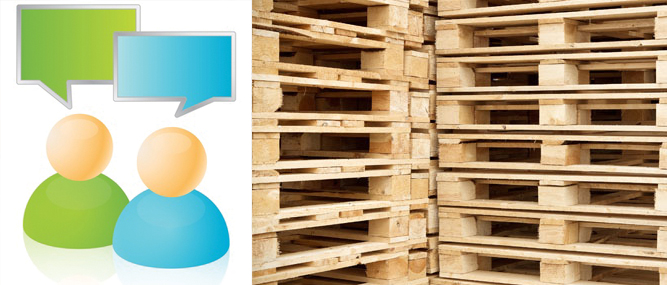Every year our readers and advertisers say things that are very insightful or sometimes even brilliant. You help us generate content that is unmatched. We couldn’t do it without your contribution and openness. The pallet and low-grade lumber industry is full of innovators and rugged entrepreneurs who know how to survive and thrive. So this is a collection of some of the greatest gems that we have heard from people quoted in the pages of the Enterprise this past year.
“So many pallet companies have buildings were docks aren’t in the proper spot,” said Bill Hildenbrand, the owner of Pallet Express. “And when you are starting off in this industry, you have to deal with what you have and can’t afford major changes to buildings. As a result, way too many companies in this industry are inefficient. They do everything two and three times. And are driving too far with stuff. Excess handling impacts productivity.” Pallet Express has added movable ramps to be able to eliminate unnecessary forklift activity.
Tony Fabrizio, president of Generated Ltd. and current CFO of Greenway, stated, “There are only two ways you are going to grow in this industry. Either you are going to have to get an infusion of capital, which means you are going to have to borrow money. And right now banks are not lending. Or you are going to acquire business by mergers and partnerships.”
Some people in the industry may argue it is not a good time to invest in plant and equipment when markets are weak and prices are down. Donnie McCraw, the owner and operator of McCraw Lumber, differs. “It’s better to do it now and have the equipment,” he said. “When this market turns around, you’re ready to saw.”
“There is a ‘huge concern’ in the industry about the future of small sawmills that pallet companies depend on for wood material,” observed Bill MacCauley, owner and president of John Rock Inc. “The owners are aging out and retiring. The trick now is to recruit younger to come into the sawmill business and teach it to them.”
Robert Eschwege, president of Valley Box, explained, “People tend to either over pack or under pack a product. They don’t understand that when it comes to cushioning and isolators you’re trying to decelerate the product at a longer rate of time to reduce the impact. People will over pack and put too much foam around the product. They might as well have just packed their product with bricks because they are not going to get the cushioning they need.”
Jeff Currier, president of Great Northern Lumber, said the greatest piece of business advice that he has ever received is that “Success breeds arrogance, so continually fight it. I was told by my grandfather and greatest influence in my life: ‘I have no doubt you will be successful, but watch out that you don’t lose yourself and forget how you got there.’ There is a lot to consider in that advice.”
Lumber sales guru, Gary Olsen, put the price issue into perspective. He suggested, “Let’s discuss price with our customers as if it were any other detail. Which is what it is. Many customers and salespeople get nervous when talking about price. If the customer asks about shipment, color or any other specifics there usually is no tension. The moment price is discussed, everyone becomes tense. Except the professional salesperson. A professional knows that price is just one of many considerations. If the salesperson stays calm when discussing price, so will your customer.”
Valley Pallet located in California is looking to add solar power generation to its facilities. The company has worked with an energy consultant to navigate the process. Frank Sheen, the owner and president of Valley Pallet Inc., explained, “The secret is getting enough power, but you don’t want too much because the amount the utilities pay is not enough to cover the cost of the added infrastructure.” He added, “The cost to install solar has gone down a lot, and it will keep on going down as the technology improves.”
“The bigger mills are still there, but there are fewer small ones,” lamented Doug Gaines, a co-owner of Madison County Wood Products. “And the competition for good timber is ferocious. A lot of people bid what they think they have to just to get it; they don’t really bid what they need to make money. There’s always problems with that. We’ve hired a certified forester to help us buy timber to help us offset that problem. So we’re throwing more dollars at securing timber.”
“The most important thing that I do is lead by example,” commented, James Ruder, the president of L&R Pallet Service. “I have made it clear that I do not believe I own L&R Pallet; I believe that I am a steward and have a responsibility to do things with the company for the people that work for me. I tell my team that I believe my company belongs to God, so I have to talk to the owner every day.”




